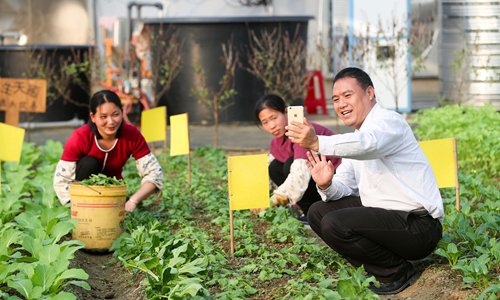
Liu Fengming, a farmer in Shuixi village in Qingyuan, South China's Guangdong Province, promotes his agricultural products through a livestream platform on January 24. Photo: VCG
Gao Aiping is happy that he finally has a fully functioning washing machine and he and his family have moved into a new home with running water.
"We used to only spin wet clothes with it in winter," said the 56-year-old.
The Gaos used to live in a mountain village in North China's Shanxi Province. There was no running water, not to mention central heating or gas supply. Whenever it snowed, they would get stuck in their home and could not even shop for food.
Last year, Gao's family and 161 other households scattered around five mountain villages were relocated to a newly built community in Linxian county, Lüliang city.
The Gaos successfully escaped poverty, with an annual income of more than 70,000 yuan (about $10,440) from working at the afforestation cooperative and a nearby vegetable greenhouse, in addition to subsidies for relocation.
China has vowed to lift all of its poor out of poverty by 2020. Alleviating poverty through relocation is one of many ways to reach that goal.
Eliminating rural poverty is considered the most difficult part of building a moderately prosperous society, one of China's two centenary goals, with 2019 a "key year" for realizing this goal.
Topics on poverty alleviation and rural development are expected to come under the spotlight during the annual sessions of China's national legislature and political advisory body.
As this year is essential for winning the tough battle against poverty by 2020, China aims to reduce the rural poor population by more than 10 million.
China has lifted 82.39 million rural poor out of poverty in the past six years, with the rural poor population down from 98.99 million in 2012 to 16.6 million last year.
Internet Plus
"Wanna get rid of poverty and become better off fast? Try e-commerce!" reads a slogan at an e-commerce startup space in Anjiazhuang township, Linxian county.
Kang Xuping, who comes from a poverty-stricken family, joined last year. The 30-year-old sold soybeans grown by local villagers.
"Our online sales exceeded 1 million yuan last year, with a net profit of more than 100,000 yuan," he said.
"I'm sure my family will get out of poverty this year with the help of e-commerce," he said.
E-commerce has also boosted sales of red dates. Nearly 70 percent of the county's annual red date output of 150 million kg are sold on the internet.
The county now has 35 e-commerce startup bases, and plans to increase the number to 1,000 this year, according to Chen Xiaolin, director of the county's poverty alleviation office.
"The Internet Plus model is an eye-catching trend. E-commerce in rural areas has made it possible for local specialties and handicrafts in rural areas to enter the urban market," said Zhao Xiaode, professor at the Party School of the Central Committee of the Communist Party of China.
"The Internet Plus model helps forge new businesses in China's rural areas and injects new impetus into rural modernization, which is essential to building a moderately prosperous society," he said.
Big data also plays a major role.
In Minqing County, Fujian Province, Wang Yongyuan no longer has to worry about his farm when he is away.
With a smartphone, he can spread the sunshade net, turn on ventilation fans and spray water when a greenhouse gets too hot. Sensors in the greenhouses help collect data on temperature, humidity and light, which he can analyze to determine climate, fertilizer, spray and output.
"The future of agriculture lies in smart and customized farming with novel farm machinery," he said.

Aerial view of Shuixi village Photo: VCG
"Beautiful villages"
Shen Jilan, 89, who served in all previous 12 terms of the National People's Congress (NPC) since 1954, is ready to attend the second plenary session of the 13th NPC.
Before going to Beijing, she knocked on the doors of fellow villagers to find out what their hopes were for a "beautiful village" in Xigou village, Pingshun county in Shanxi.
"There are many villages such as Xigou in China and the government should invest more to improve the infrastructure and build a pleasant environment there, and turn lucid waters and lush mountains into invaluable assets," she said.
Xigou has more than 1,600 hectares of trees in the mountains. Shen has been thinking about turning the forest into a tourist attraction to help her village prosper.
China unveiled a three-year plan to improve the rural living environment last year, defining it as an important task for the country to accomplish the goal of building a moderately prosperous society in all respects. It also aims to lift 12 million people out of poverty through tourism during the 13th Five-Year-Plan period (2016-20).
"I hope to see 'beautiful villages," Shen said. "As long as we unite as one and make arduous efforts, a moderately prosperous society will be built on time."

